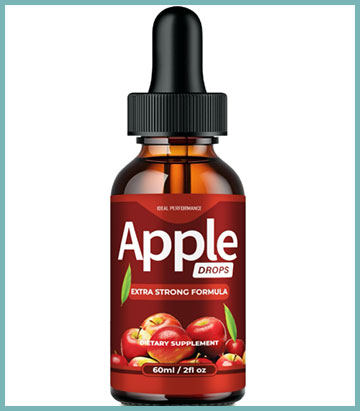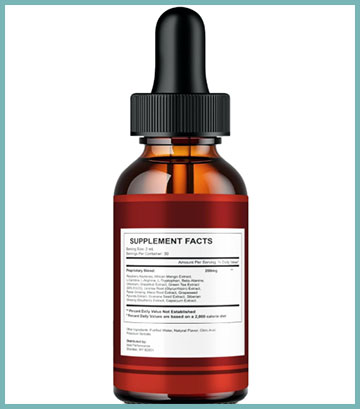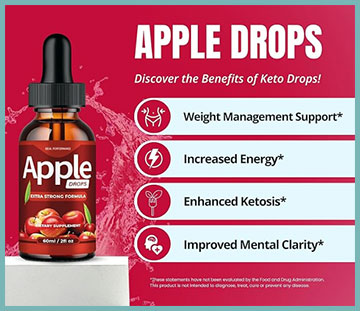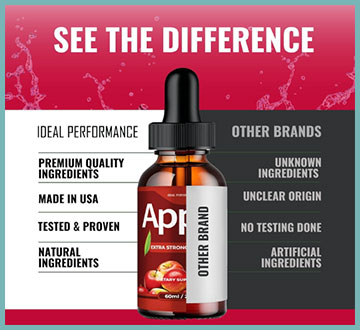I’ve tried my fair share of weight loss supplements, and when I stumbled across Apple Drops, I was curious but skeptical. The promises of effortless weight loss and boosted metabolism sounded tempting, but the reality didn’t live up to the hype.
After diving into my experience and researching what’s out there, I’m convinced you’re better off exploring other options. In this article, I’ll walk you through my journey with Apple Drops, break down the pros and cons, share maintenance tips, compare it to other brands, and answer common questions to help you make an informed decision.
My Experience With Apple Drops

When I first heard about Apple Drops, I was drawn in by the idea of a natural supplement that could help me shed a few pounds while supporting my overall health.
The marketing was slick—promises of apple cider vinegar, polyphenols, and herbal extracts working together to curb appetite and boost metabolism.
I ordered a bottle from the official website, hoping it would be a game-changer in my weight loss journey.
The drops arrived in a sleek bottle with clear instructions: mix a few drops into water, take twice daily before meals, and pair with a healthy diet and exercise for best results.
The taste was my first hurdle. It wasn’t awful, but the sharp, vinegary tang mixed with a slightly artificial berry flavor wasn’t exactly pleasant.
I powered through, mixing it into a full glass of water to dilute the taste, but it never became something I looked forward to.
For the first week, I felt a slight decrease in appetite, which got me excited. I thought, “Maybe this is it!” But that effect faded quickly. By week two, I was back to my usual hunger levels, and the scale hadn’t budged. I was diligent—taking the drops consistently, eating balanced meals with plenty of veggies and lean proteins, and hitting the gym four times a week. Yet, after a month, I’d lost only a pound, which could easily be attributed to my usual routine rather than the drops.
I started digging into reviews on sites like Amazon and Walmart, and I wasn’t alone. Many users reported no weight loss, with some even mentioning side effects like stomach discomfort or grogginess. One Amazon review caught my eye: a user loved the sleep benefits but saw no weight loss, which mirrored my experience. Another mentioned the high cost for minimal results, which hit home—$50 for a small bottle that didn’t deliver felt like a rip-off.
I also noticed the company’s return policy was a headache. Some users on Reddit complained about being unable to get refunds, with one describing a scam-like experience where they were charged double and couldn’t cancel the order. That made me wary of ordering more. My experiment with Apple Drops left me disappointed, and I couldn’t shake the feeling that I’d fallen for clever marketing rather than a product that actually worked.
Read More: My Thoughts On Juna Weight Loss
Pros Of Apple Drops
- Natural ingredients: The formula includes apple cider vinegar, green tea extract, and polyphenols, which have some scientific backing for supporting metabolism and heart health. These are appealing if you’re looking for a supplement free of synthetic chemicals.
- Easy to use: Mixing a few drops into water is simple and fits easily into a daily routine, especially if you’re already drinking plenty of water throughout the day.
- Mild appetite suppression: For the first few days, I did feel slightly less hungry, which could help someone trying to cut back on snacking, though the effect was short-lived.
- No caffeine jitters: Unlike some weight loss supplements loaded with stimulants, Apple Drops didn’t leave me feeling wired or anxious, which was a relief.
Cons Of Apple Drops

- Minimal weight loss results: After a month of consistent use, I saw no significant change in my weight, and many online reviews echoed this, with users reporting little to no fat loss even with diet and exercise.
- Unpleasant taste: The vinegary, slightly artificial flavor was hard to stomach, even when diluted, making it a chore to take daily.
- Expensive for the value: At around $50 for a small bottle, the cost feels unjustified when the results are negligible compared to lifestyle changes alone.
- Questionable business practices: Reviews on sites like Reddit and BBB Scam Tracker mentioned issues with refunds, unexpected charges, and shady subscription models, raising red flags about the company’s trustworthiness.
- Potential side effects: Some users reported stomach upset or grogginess, and while I didn’t experience this, the lack of clear warnings about possible reactions was concerning.
Maintenance Tips For Apple Drops

- Consistency is key: If you decide to try Apple Drops, take them at the same time each day—ideally before meals—to maximize any potential appetite-suppressing effects. I found setting a phone reminder helped me stay on track.
- Dilute properly: The taste can be off-putting, so mix the drops into at least 8 ounces of water. I tried adding a splash of lemon juice to mask the flavor, which made it more palatable.
- Pair with a healthy lifestyle: The drops won’t work miracles on their own. I saw the best results (however minor) when I stuck to a balanced diet with whole foods and regular exercise, like brisk walks or strength training.
- Monitor your body: Pay attention to how your body reacts. If you feel nauseous or sluggish, stop using the drops and consult a doctor. I kept a journal to track any changes, which helped me realize the drops weren’t doing much.
- Check the return policy: Before ordering, read the fine print on the website. I learned the hard way that refunds can be tricky, so consider using a credit card with strong buyer protection.
Comparison With Other Brands

- Weight Watchers (WW) Supplements: I’ve also tried Weight Watchers’ line of supplements, which focus on meal replacement shakes and protein bars rather than drops. Unlike Apple Drops, WW’s products are part of a broader program that includes dietary guidance and community support. I found their shakes more filling and easier to incorporate into my day than the drops, and the structured plan helped me lose a few pounds over a couple of months. However, WW’s supplements are pricier upfront, and the program requires a subscription, which can feel restrictive if you prefer flexibility.
- Garcinia Cambogia Supplements: Garcinia cambogia was another supplement I tested, drawn by its claims of fat-blocking properties. Like Apple Drops, it’s marketed as a natural weight loss aid, but I found the results similarly underwhelming. Both products rely on herbal extracts, but garcinia cambogia pills were easier to take—no vinegary aftertaste. However, I experienced mild digestive issues with garcinia, which I didn’t with Apple Drops. The kicker? Garcinia supplements are often cheaper, sometimes half the price of Apple Drops, but the lack of results made both feel like a waste.
- Orlistat (Alli): I briefly tried Alli, an over-the-counter version of the prescription drug orlistat, which works by blocking fat absorption. Unlike Apple Drops, Alli has FDA approval and clinical studies showing modest weight loss—about 5-10 pounds over six months when paired with a low-fat diet. I lost a couple of pounds with Alli, but the side effects (like oily stools) were a dealbreaker. Apple Drops felt gentler on my system, but Alli’s proven efficacy made it a more reliable choice, despite the discomfort.
- MyFitnessPal App: While not a supplement, I’ve used the MyFitnessPal app to track my diet and exercise, and it’s been far more effective than Apple Drops. The app’s calorie tracking and nutritional insights helped me lose 8 pounds over three months by making me mindful of my eating habits. Unlike Apple Drops, it’s free (with optional premium features) and doesn’t involve ingesting anything, so there’s no risk of side effects. The downside is the time commitment to log meals, but the results were worth it compared to the drops’ negligible impact.
- Semaglutide (Wegovy): I haven’t personally tried Wegovy, but I know people who have, and it’s a prescription medication that’s shown impressive results—up to 15% body weight loss in clinical trials. Unlike Apple Drops, Wegovy is backed by robust science and FDA approval, but it requires a doctor’s prescription and can be expensive without insurance. Side effects like nausea are common, but the weight loss is significant. Apple Drops, by contrast, feels like a lightweight contender with no real evidence to back its claims.
Read More: My Thoughts On Trimova Weight Loss Drops
Frequently Asked Questions (FAQ)
In my experience, Apple Drops didn’t live up to their weight loss promises. I saw minimal results after a month, and many online reviews on sites like Amazon and Walmart echo this, with users reporting little to no fat loss. The science behind ingredients like apple cider vinegar and polyphenols suggests some metabolic benefits, but studies show these are modest at best and require a healthy diet and exercise to make a difference. You’re better off focusing on sustainable lifestyle changes than relying on these drops for significant weight loss.
Apple Drops contain a blend of natural ingredients, including apple cider vinegar, green tea leaf extract, garcinia cambogia, cinnamon bark, and polyphenols like those found in apples. Some formulations also include cayenne pepper, melatonin, and caffeine anhydrous, according to Amazon product listings. These ingredients aim to boost metabolism, suppress appetite, and support circulation, but their effectiveness varies widely based on individual factors. Always check the label for potential allergens and consult a doctor if you’re unsure about any component.
It’s tough to pinpoint one “best” supplement, as effectiveness depends on your body and lifestyle. In my experience, tracking food intake with an app like MyFitnessPal was more effective than any supplement, including Apple Drops. For supplements, orlistat (Alli) has some evidence for modest weight loss, while prescription options like semaglutide (Wegovy) show stronger results but require medical supervision. Always pair supplements with diet and exercise, and consult a healthcare provider to find what works for you.
Polyphenol supplements, like those in Apple Drops, are generally safe but can cause side effects in some people. I didn’t experience any, but online reviews mentioned stomach upset, nausea, or grogginess. Research from WebMD suggests polyphenols may interact with medications or cause digestive issues if taken in high doses. If you have conditions like acid reflux or gastroparesis, be cautious, as the acidity in apple cider vinegar could worsen symptoms. Always start with a low dose and talk to your doctor if you notice adverse reactions.
Conclusion: For Apple Drops
After giving Apple Drops a fair shot, I can’t recommend them. The lack of significant weight loss, unpleasant taste, and high cost make them a poor choice compared to other options. While the natural ingredients and ease of use are appealing, the results don’t justify the price or the hassle of navigating questionable business practices. Save your money and focus on proven strategies like a balanced diet, regular exercise, or evidence-based supplements with stronger scientific backing.
